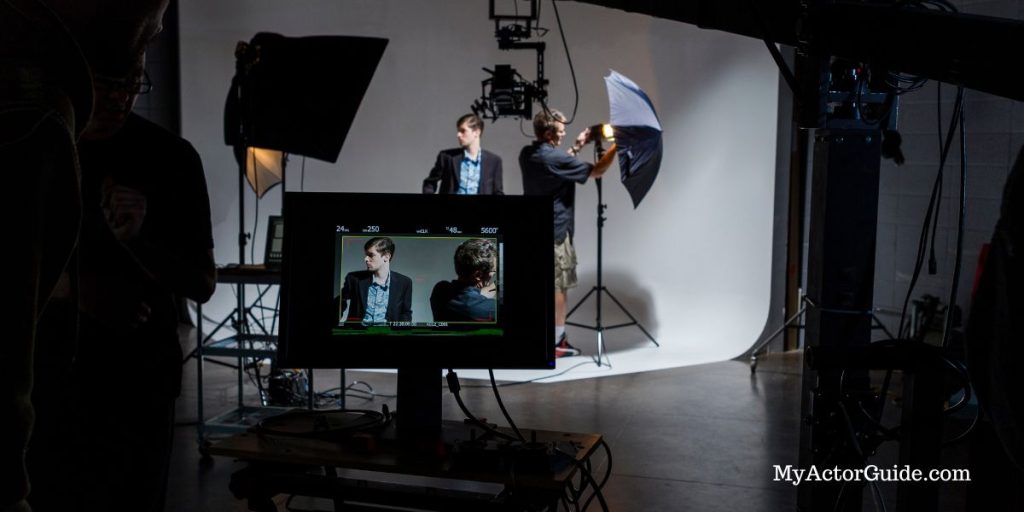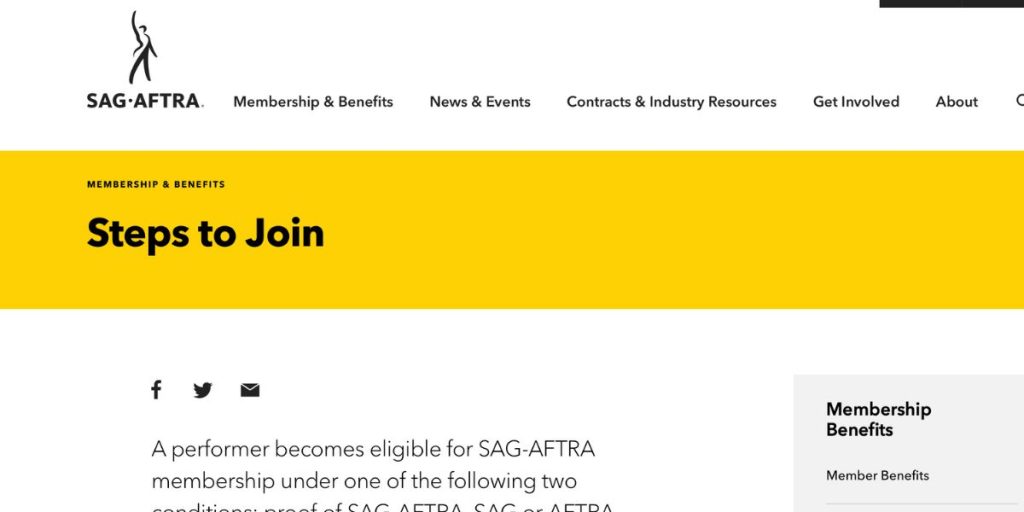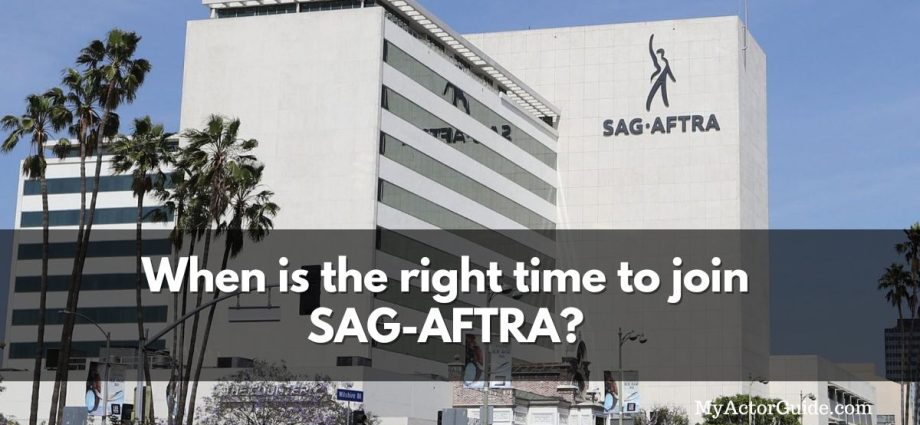This post may contain affiliate links, so I may receive a commission, at no cost to you, if you make a purchase through a link. Check out the disclosure for more info. And thank you for supporting free content!
When is the right time to join SAG-AFTRA?
This is a one of the most angst ridden and pressing questions for every actor! Unions: When to join the actors’ union? And if you’re in the U.S., that means SAG-AFTRA.
Everyone goes through several rites of passage in this business, also known as scary places where you’re leveling up. The obvious one is when you book your first paying gig, shooting your first commercial, booking your first TV show. If you’ve never done it before, then it’s natural for it to be a little overwhelming and scary.
These are the moments that allow us to move from one phase of our careers to the next. It’s similar to leveling up in a video game; once you get past the obstacles and to the next level, new opportunities present themselves. And when they do, you’re better equipped to take advantage of them!
You’ll probably hear all sorts of mixed opinions on whether or not to join the union. And what’s the difference between being Non-Union vs SAG-Eligible vs a SAG-AFTRA member? Here I’m going to give you the pros and cons so you can make an informed decision, and feel confident about your union status, wherever you are at in your career.

NON-UNION
This is where we all start out; Ground Zero. You’re new to the business, no résumé and no credits. And you have no affiliation or association with any union, whether it’s SAG-AFTRA in the United States or ACTRA in Canada. You can easily work on any project you choose that has no union affiliation. But if the project is Union, that is where it gets a little bit complicated. We’ll come back to the specifics of that in a moment, but first let’s go over the pros and cons of being a non-union actor.
The PROS
- There are a lot more non-union opportunities / jobs / projects casting at any given time.
- Most commercial reps are very happy to work with non-union actors as there are a ton of opportunities and they receive a bigger commission check, 20% v.s. 10% for union commercials.
- When you’re just starting out, commercials are a great place to start! And being non-union can actually make it easier to get a commercial agent.
- A huge number of made-for-TV movies are also shot non-union, and they can be a great place to get some experience and build your résumé.
The CONS
- There are no enforced standards or official vetting or protections in place for actors on most non-union projects. Things like overtime pay, insurance, residuals, pay for wardrobe calls and rehearsal days may not be covered.
- While you might be able to audition for network TV episodic productions and union commercials, the chances of you getting a callback and/or booking are slimmer due to the fast turnaround time most projects have and the extra hoops production would have to jump through in order to approve you for the job. Obviously, this is not always the case because somehow we all make it into the union, and that only happens when you’ve worked on a union production.
- Some agents and managers, especially commercial agents, may pressure actors to stay non-union “as long as possible” since their commission on non-union work is 20%. This makes it important to ask yourself if the advice you’re being given is putting your career goals first or your reps? If this is resonating with you, and you’re more focused on booking episodic work it might be time to assess whether or not your reps have the interest and incentive to help you reach your goals.
Also read: How To Spot A Casting Scam

UNION ACTORS / SAG-AFTRA
If you’re an actor, joining SAG-AFTRA, Screen Actors Guild–American Federation of Television and Radio Artists, or ACTRA, Alliance of Canadian Cinema, Television and Radio Artists is a major career milestone. It’s one of the most concrete things in an otherwise nebulous career, that marks you as a Professional who is ready to commit to a career in the film and television industry.
The PROS
- You can be hired for any union production without casting directors or production having to worry about extra paperwork. (See Taft-Hartley below)
- The pay rates are excellent, much higher than non-union work and for most projects there are residuals or a one time buyout.
- You get amazing working conditions on set and your safety and well-being or made a priority.
- If you earn enough money, (and full disclosure more than 90% of union actors don’t ) you get excellent health insurance
- You gain access to a ton of wonderful opportunities via SAG-AFTRA such as free industry workshops, “screeners’ during award season, networking events and more
- You can still AUDITION for non-union productions, as long as you encourage that production to complete the union paperwork and switch to a union contract if they want to hire you.
- And, you actually get a pension when you retire. If you’re under 40, a pension probably doesn’t mean a lot to you right now, but you’ll be glad you have one when you’re coming up on 65 😎
The CONS
- As mentioned earlier, many commercial agents prefer non-union actors since roughly 80% of commercials shot today are non-union projects
- Some theatrical reps might be discouraged to work with actors that are union and don’t have a lot of footage or credits
- You can’t do ANY non-union work – not commercials, film, episodics or even that web series your friend is shooting or the short film you’re trying to get off the ground
- There is a $3000 fee to join the union + regular semiannual dues, so make sure you have the money available when you are ready

Industry Talk
SAG-Eligible / Taft-Hartley
This can get a little complicated, because in order for a TV episodic production to hire you, they have to fill out paperwork, including a form known as Taft-Hartley. In theory, it sounds easy enough, but often times TV has a very quick turnaround and if they need you on set tomorrow or the next day, they might not have time to complete all of the paperwork needed and have it approved by SAG. (Yes, SAG must approve it.)
A Taft-Hartley is the report that is filed with SAG-AFTRA after a SAG-AFTRA signatory producer hires an actor who does not currently belong to the union.
The company or casting director must provide an explanation for why the non-union actor was chosen for the job over a union actor. If you’re thinking this sounds like a pain in the butt, you’re right! But again, we all join the union somehow, so it is done.
Recently, I was talking to a producer of a well known network TV show and I asked them how often they “Taft-Harley” actors. The answer: “Rarely…. because I have to prove you’re the only person outside of all the union actors to do this union job, and this process can be cumbersome.”
The TV landscape moves super fast! When you can, it make sense to help make the decision making process a little easier by needing less paperwork for production.
What does SAG-AFTRA Eligible mean? And what make you eligible for SAG?
From the SAG-AFTRA website:
“SAG-AFTRA membership is available to those who work in a position covered by a SAG-AFTRA (or AFTRA or SAG) collective bargaining agreement, provided that any person qualifying through work as a background actor must have completed three (3) days of work as a background actor under a SAG-AFTRA (or AFTRA or SAG) collective bargaining agreement. Membership is also available to those who work one (1) day of employment in a principal or speaking role (actor/performer), or as a Recording Artist in a SAG-AFTRA (or AFTRA or SAG) covered production.”
Also read: 53 Film Terms Actors Need to Know to Survive On-Set

SAG-AFTRA Eligible v.s. Must Join
If you get hired for a SAG-AFTRA job as a non-union actor, you don’t have to join unless you’ve worked 3 union jobs or been hired to be on set for over 30 days as of August 2019.
“SAG-AFTRA E” and “Must Join” are pretty much the same thing.
When you first become SAG-AFTRA Eligible, you’ll get a letter saying you have 30 days to work as many Union gigs as you can book without having to join the union and pay the steep joining fee and dues.
After the 30 days, you’re SAG-AFTRA Eligible and a you must join the union to work on your next union job.
In this time period when you are “Must Join” but haven’t taken the plunge yet, many actors will put SAG-AFTRA on their resume when auditioning for Union projects and SAG-AFTRA Eligible when auditioning for non-union ones.
* If you book a Union gig, then make sure you have the $3000 to pay SAG-AFTRA. This is non-negotiable. Note: I do think they allow payment plans of 3 or 4 installments
The PROS
- SAG-AFTRA Eligible is often known as “the sweet spot” according to many reps, because if you want, you can still do non-union work and at the same time be hired seamlessly (without the cumbersome initial paperwork) for union jobs.
- If you don’t have a ton of credits and footage many reps prefer that you be SAG-E so that you can get some more experience on set via non union productions but still go out for episodic productions with a good chance of booking.
The CONS
- Some casting offices won’t bring in actors who are SAG-AFTRA Eligible and will stick firmly to union actors only.
- If you book a Union gig, you have to have the $3000 saved up to pay SAG-AFTRA. This is non-negotiable but I do think they allow payment plans of 3 or 4 installments.
Also read: How To Be A Background Actor: The Complete Guide

Quick Note: I want to hear from you!
Are you SAG Eligible? Do you have any union credits? Are you thinking about joining? I’d love to know where you’re at in your career! Let me know in the comments below.
Industry Insider
A few years ago an actor friend of mine auditioned for a major TV show. Just before this, they had sent the casting office a promo piece that mentioned they’d just joined SAG.
At the audition this actor had the chance to chat with the casting associate. The actor mentioned that they loved the show and that the reps had been submitting them for a while now, so they were super happy to finally come in. The response was kind of surprising; the associate said that they had wanted to bring the actor in previously but didn’t because union status was “SAG-E” and they only saw actors that are fully SAG actors.
SAG-AFTRA: To join or not to join
To join SAG-AFTRA is definitely a rite of passage for any actor. I’ll be honest with you, I fought hard for my union card and it felt frigging awesome when I finally got it! When I started acting you needed 6 credits / speaking roles to join the union, not 1 and background work didn’t count…. So this was a huge milestone! Still, there is the common argument that if you join an actors’ union, whether it’s SAG-AFTRA, ACTRA or Equity, you are limited to only union work.
Again, keep in mind that non-union productions often don’t cover insurance, overtime or have any safety protocols to follow. And today, at least in LA, there is a plethora of SAG projects from New Media to even Student Films, so there is never a shortage of work from that perspective.
Ultimately, you have to decide for yourself, based on your career goals, where you’re at in your career, and very importantly your location. Different markets vary widely in what’s being shot there. I hope this helps you to make an informed decision that you’re confident is the best thing for your career at this time!
Was is this article helpful? Let me know in the comments below what was most useful to you.
Like it if you like it! Share it, tweet it, post it, pin it or send to a friend! You never know who you might help with one simple click!

* Please Note: I am not an agent, manager, or casting director. I do not procure work for actors. All information, workshops and coaching are for educational purposes only and are not a guarantee or promise of employment. Thank you for being here!





